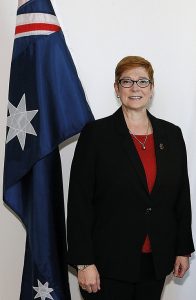Marise Payne, Australia: Survivalist
 Australia is determined to boost its punch with an outlay of A$200bn ($152bn/€128bn) on new military hardware. The recently unveiled ten-year spending programme is to give teeth to the defence white paper released in 2016 which maps threats to the stability of the wider Indo-Pacific Region and suggests appropriate responses. Minister of Defence Marise Payne, a senator for New South Wales and former minister for Human Services, is charged with carrying out the ambitious plan. This requires the minister to tread a fine line between Chinese sensitivities and American bluster.
Australia is determined to boost its punch with an outlay of A$200bn ($152bn/€128bn) on new military hardware. The recently unveiled ten-year spending programme is to give teeth to the defence white paper released in 2016 which maps threats to the stability of the wider Indo-Pacific Region and suggests appropriate responses. Minister of Defence Marise Payne, a senator for New South Wales and former minister for Human Services, is charged with carrying out the ambitious plan. This requires the minister to tread a fine line between Chinese sensitivities and American bluster.
Mrs Payne admitted that her country’s regional environment has become “more complex” but denied the charge that the proposed investments in capital ships and fighter planes equips Australia for the next war with the weaponry of the last one. The white paper calls for significant efforts to bolster the country’s cyber, space, and information warfare capabilities. Mrs Payne emphasised that some 800 new positions will be created in armed forces branches dedicated to defend against unconventional and asymmetrical threats. In April 2017, Australia and China formally agreed not to raid each other’s intellectual property and trade secrets via cyber-attacks.
Still, the grand buying-spree Mrs Payne has now embarked on seeks to re-arm Australia for classic warfare and includes, amongst others, “regionally superior” submarines, major surface combatants, and offshore patrol vessels – a dozen of each. Additionally, Australia is in the market for 72 F-35 Joint Strike Fighters, 15 maritime surveillance aircraft, and a host of other hardware such as in-flight refuelling planes, transport helicopters, and replenishment vessels.
“The focus on countering China is misplaced. We are in the wrong century when expecting the principal threat against Australia’s security to come from China’s power projection,” says Professor Greg Austin of the Australian Centre for Cyber Security at the University of New South Wales in Canberra: “We should be much more concerned about the emergence of an Islamic state in our region and, indeed, about cyber warfare – perils that cannot be met with destroyers and frigates.”
Mrs Payne seems to agree that an “area denial policy” for China makes little sense without the full backing of the United States – an unattractive proposition as long as President Trump is calling the shots. Moreover, long-time China watchers doubt that Australia even appears on Beijing’s radar. The aggressive policies pursued in the South China Sea are mainly directed at nearby countries and, as such, pose no direct – or indirect – threat to Australia.
A survivalist in the often vicious sectarian infighting for which Australia’s Liberal Party is known, Marise Payne has so far managed to stay well above the fray in what is derisively known as the “philosophers’ club” – the government of Prime Minister Malcolm Turnbull which is widely accused of ignoring bread-and-butter political issues. An able administrator, Mrs Payne clearly prefers a cautious and pragmatic approach over grandstanding. As such, she is considered particularly well placed to ensure Australia’s national defence remains securely pivoted on US cooperation – intensified during the Obama Administration – whilst enabling the country to meet new threats with the panache for which it is well-known – and respected.
You may have an interest in also reading…
JK Rowling: Inspiring Words Matched to an Inspiring Life
When the first edition of a book published in 1997 already fetches upward of twenty-thousand pounds, it is sure to
Mohamed Ould Abdel Aziz: A Pragmatist Claiming Centre Stage
It is a long lane that has no turning. The life of Mauritanian president Mohamed Ould Abdel Aziz is marked
Balancing Act in Tunisia
In 2011, popular protests in Tunisia rid the country of Zine al-Abidine Ben Ali and towards year end Moucef Marzouki


















































































